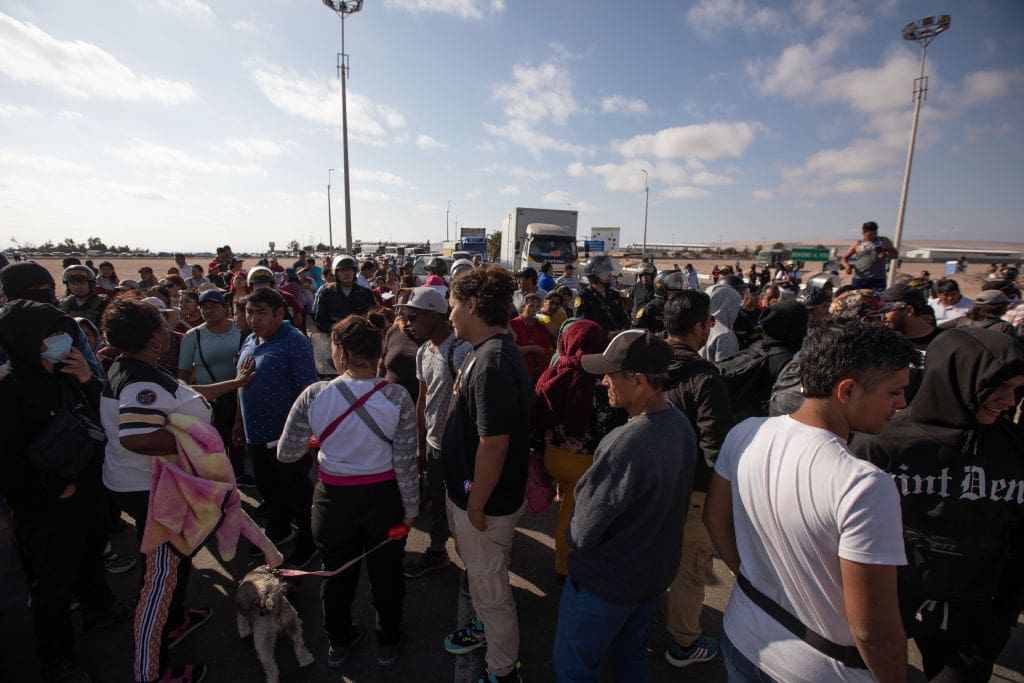On occasion of World Refugee Day, Amnesty International has issued an open letter to the states parties to the Cartagena Declaration on Refugees, who are currently meeting in Bogotá, urging them to put human rights at the heart of their new regional plan of action for the coming decade.
“Every year, we see hundreds of thousands of people in the Americas forced to leave their homes, fleeing violence, the effects of climate change and massive human rights violations. In the face of this painful and growing reality, the new roadmap being prepared by the signatories of the Cartagena Declaration for the period 2024-2034 must renew the unequivocal commitment to protect refugees, asylum seekers and stateless persons in our region,” said Ana Piquer, Americas director at Amnesty International.
On June 19 and 20, the states parties to the Cartagena Declaration on Refugees will be meeting in Bogotá for the third thematic consultation meeting of the year, with a view to the adoption in December of the Chile Declaration and Plan of Action, which will provide a framework for action for the next decade. Discussions will focus on the situation of persons displaced by the effects of climate change and other disasters in the region. Previous consultations, held in Mexico in April and in Brazil in May, focused on the protection of people on the move and stateless persons, as well as their inclusion and integration through alternative, comprehensive and sustainable solutions.
In this context, Amnesty International’s open letter focuses in particular on the challenges that remain in ensuring the protection of Venezuelan and Haitian nationals fleeing the devastating humanitarian and human rights crises in their countries of origin. It also highlights the opportunities offered by the Cartagena Declaration to provide protection to people displaced by the effects of slow onset or sudden onset climate change and disasters.
Amnesty International welcomes the fact that a significant number of states in the region have incorporated the definition of a refugee contained in the Cartagena Declaration into their national legislation. However, the organization regrets that in practice, the authorities in most of these countries rarely use this definition to protect persons in need, leaving millions of people devoid of protection and in a situation of great vulnerability. In contrast to the setbacks in countries such as Chile or Peru, states parties must regain the global leadership on refugee protection that the signing of the Declaration represented 40 years ago, especially for women refugees. Amnesty International urges states to act in accordance with their national and international protection and human rights obligations, and to incorporate an intersectional, antiracist and gender perspective.
“Now is the time for states in the Americas to rise to the occasion and commit to protecting the most marginalized population groups in the region. Today, more than ever, we expect states to provide coordinated and lasting solutions that respect the dignity of those who seek and are in need of protection. Recognizing and fully implementing the Cartagena Declaration would be a step in the right direction,” added Ana Piquer.
Background information
The 1984 Cartagena Declaration on Refugees is one of the most important legal, political and strategic instruments on issues of protection in Latin America and the Caribbean in recent decades. Since 2004, the region has adopted ten-year action plans –specifically the Mexico Plan of Action and the Brazil Plan of Action– to address the evolving challenges of displacement. Amnesty International has for many years relied on this instrument to call for international and complementary protection for persons in need of protection in the Americas.
2024 marks the 40th anniversary of the Cartagena Declaration and the launch of the Cartagena+40 process, hosted by the government of Chile with the support of the United Nations High Commissioner for Refugees (UNHCR), in which countries in Latin America and the Caribbean have pledged to produce: three regional consultations between April and June, one for each thematic area; negotiations leading to the adoption of a Political Declaration and the Chile Plan of Action 2024-2034, to be held in Geneva between September and November; and a ministerial event, to be held in Chile, under the auspices of the ECLAC, on December 11 and 12, 2024, to finalize the process.
Contact: [email protected]

